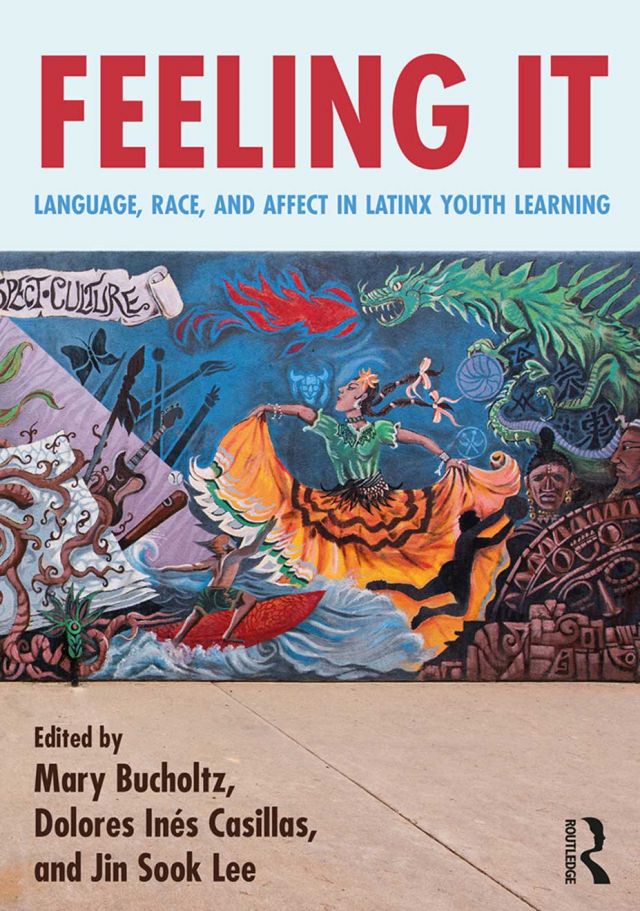Publications
In Press
Bucholtz, M., Casillas, DI., Lee, J. (forthcoming). The Transformative Power of Heritage Languages in Youth-Centered Classrooms. In Tryphenia B. Peele-Eady (ed.), Integrating Home and Heritage Languages in Schools: Pedagogy and Promise. Routledge.
2020-21
Bucholtz, M., Lee, J., Meier, V., Harris, S., & Casillas, DI. (2021). School Kids Investigating Language in Life and Society: Growing Pains in Creating Dialogic Learning Opportunities. In Amanda Kibler, Guadalupe Valdés, and Aída Walqui (eds.), Reconceptualizing the Role of Critical Dialogue in American Classrooms, 52-77. Routledge.
Bucholtz, M., Casillas, DI., Lee, J. (2020). Resisting Racism and Neoliberalism in Critical Language Research and Activism with Racialized Youth. In Arshad Ali and Teresa L. McCarty (eds.), Critical Youth Research in Education: Methodologies of Praxis and Care, 21-39. Routledge.
Bucholtz, M., Ferrada, J., & Corella, M. (2020). "Respecta mi idioma": Latinx Youth Enacting Affective Agency. Journal of Language, Identity & Education UC Santa Barbara. Retrieved from https://escholarship.org/uc/item/8283p2bn
2018-19
Bucholtz, M., Casillas, D., & Lee, J. (2019). California Latinx Youth as Agents of Sociolinguistic Justice. In Language and Social Justice in Practice. UC Santa Barbara. Retrieved from https://escholarship.org/uc/item/8h01z5qf
Bucholtz, M., Casillas, D., & Lee, J. (2018). You Feel Me?: Language and Youth Affective Agency in a Racializing World. In Feeling It: Language, Race, and Affect in Latinx Youth Learning. UC Santa Barbara. Retrieved from https://escholarship.org/uc/item/2sq8j7r6
Bucholtz, M., Casillas, DI., Lee, J. (2018). Feeling It: Language, Race, and Affect in Latinx Youth Learning. Routledge.
Bucholtz, M., Casillas, D., & Lee, J. (2018). After Affects. In Feeling It: Language, Race, and Affect in Latinx Youth Learning. UC Santa Barbara. Retrieved from https://escholarship.org/uc/item/55z1c2p8
2016-2017
Bucholtz, M., Casillas, D., & Lee, J. (2017). Language and culture as sustenance. In Culturally sustaining pedagogies: Teaching and learning for justice in a changing world. UC Santa Barbara. Retrieved from https://escholarship.org/uc/item/1m47q3c7
Bucholtz, M., Casillas, D., & Lee, J. (2016). Beyond Empowerment: Accompaniment and Sociolinguistic Justice in a Youth Research Program. In Sociolinguistic Research: Application and Impact,. UC Santa Barbara. Retrieved from https://escholarship.org/uc/item/6033d7jj
2014-15
Bucholtz, M., & Lee, J. (2015). Language socialization across learning spaces. In Handbook of Classroom Discourse and Interaction. UC Santa Barbara. Retrieved from https://escholarship.org/uc/item/4h89b3z0
Bucholtz, M., Casillas, DI, & Lee, JS. (2015). Team collaboration and educational partnership in sociocultural linguistics. American Speech, 90(2), 230-245. http://dx.doi.org/10.1215/00031283-3130346 Retrieved from https://escholarship.org/uc/item/5949f22k
Bucholtz, M., Lopez, A., Mojarro, A., Skapoulli, E., VanderStouwe, C., & Warner-Garcia, S. (2014). Sociolinguistic Justice in the Schools: Student Researchers as Linguistic Experts. Language and Linguistics Compass, 8(4), 144-157. Report #: 4. http://dx.doi.org/10.1111/lnc3.12070 Retrieved from https://escholarship.org/uc/item/5mh68871
Bucholtz, M. (2014). Teaching Students the SKILLS of Linguistic Research. In We Do Language: Understanding English Language Variation in the Secondary English Classroom. UC Santa Barbara. Retrieved from https://escholarship.org/uc/item/1mm7m59n

Feeling It
Language, Race, and Affect in Latinx Youth Learning
Edited By
Mary Bucholtz, Dolores Inés Casillas, Jin Sook Lee
Book Description
Feeling It brings together twelve chapters from researchers in Chicanx studies, education, feminist studies, linguistics, and translation studies to offer a cohesive yet broad-ranging exploration of the issue of affect in the language and learning experiences of Latinx youth. Drawing on data from an innovative social justice-oriented university-community partnership based in young people’s social agency and their linguistic and cultural expertise, the contributors are unified by their focus on a single year in the history of this partnership; their analytic focus on race, language, and affect in educational contexts; and their shared commitment to ethnography, discourse analysis, and qualitative methods, informed by participatory and social justice paradigms for research with youth of color. Designed specifically for use in courses, with theoretical framing by the co-editors and ethnographic contributions from leading and emergent scholars, this book is an important and timely resource on affect, race, and social justice in the United States. Thanks to its interdisciplinary grounding, Feeling It will be of interest to future teachers and to researchers and students in applied linguistics, education, and Latinx studies, as well as related fields such as anthropology, communication, social psychology, and sociology.